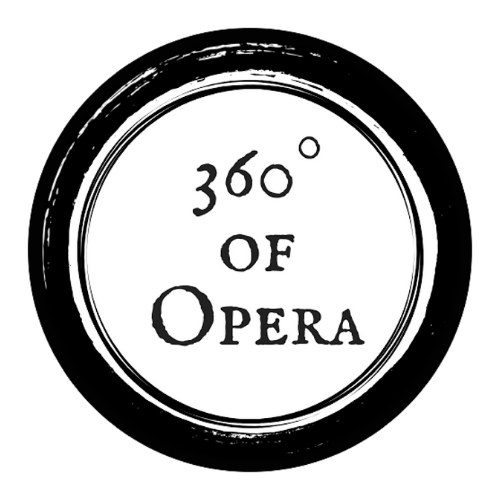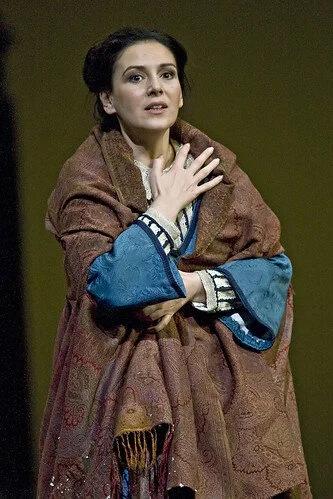Atelier d’Excellence Artist Spotlight: Alexia Voulgaridou, Soprano
As Atelier d’Excellence prepares to launch its Opera Role Prep Lab, we inaugurate this new column, where we will be featuring international artists involved with the organization.
In this new AdE lab, singers will have the opportunity to study a role under a renowned Opera singer praised worldwide for their interpretation of the featured Opera's main character and an acclaimed conductor/coach. All mentors follow a holistic approach incorporating all relevant elements such as musicality, technical issues, interpretation and improvement of language skills.
This first edition focuses on Puccini’s La Bohème and will be led by internationally renowned Soprano Alexia Voulgaridou and Italian pianist/coach Laura Pasqualetti.
We had the pleasure of interviewing Alexia Voulgaridou ahead of this event. The Greek Soprano has been critically acclaimed for her dazzling performances, is a regular guest at the most prestigious European and American opera houses, concert halls, and music festivals.
Ms. Voulgaridou began her musical studies in Athens and continued them at conservatory in Munich under the tutelage of Daphne Evangelatos, where she also participated in master classes with Astrid Varnay. She made her professional debut at the Prinzregententheater in Munich as Susanna in Le nozze di Figaro under the baton of Sir Colin Davis.
Soon afterwards, she sang Sophie in a new August Everding production of Der Rosenkavalier at the Bavarian State Opera. Other roles followed, including Violetta in La Traviata, the three heroines in Les contes d’Hoffmann, Marzelline in Fidelio, and Pamina in Die Zauberflöte, in Hannover, Munich, Darmstadt, and Cologne. Soon after her great success at the Bregenz Festival as Mimì in La Bohème, she debuted in Geneva as Mimi and also sang the role in Munich.
1. What place does Mimì hold in your career and what has been a highlight of your performances of the role for you?
Mimì’s role in the opera “La Bohème” was a milestone in my longstanding career. My first time singing Mimì was at the Bregenz International Festival. Afterwards, I performed at the biggest theatres of the world. I certainly pick some productions out, because they either are particular or they are full of personal moments that stay with us forever. I will never forget “La Bohème” at the Opera de Tenerife, which was conducted some weeks after my dad’s death. Back then, I thought that I would not be able to open my mouth, that I would be overwhelmed by grief and other emotions and that sadness would conquer everything. Nevertheless, it was one of my best productions! I felt like sending all of my heart to my beloved father up there. Another fateful Mimì was at Teatro alla Scala in Milan and at Staatsoper in Berlin with Jonas Kaufmann and Gustavo Dudamel conducting the opera. Pure enthusiasm!
La Bohème at Royal Opera House
(Credit: Clive Barda)
2. You have also sung other leading roles by Puccini like Madama Butterfly, Tosca, Magda and Liù, what is something that you think unites them all?
Throughout my career so far, Puccini’s heroines have a leading role. What I mostly admire about them is their passion to live every moment of their lives. It is an attractive feature. From the simple “Mimì”, to the coquette “Musetta” and from the lovestruck “Madama Butterfly” to the passionate “Tosca”, they are all overwhelmed with truth and they compose a range of emotions to the full.
3. In 2021, you will hopefully be singing Suor Angelica as well, how are you preparing to add this role to your repertoire?
The role of Suor Angelica is included in a breathtaking plot. The opera frame reminds me of the Poulenc’s “Dialogues des Carmelites”. The nuns, with their unique character and past, were led, for personal reasons, to depart the mundane life. Blanche, the virgin one, always wanted to rescue herself from her fears. Suor Angelica, having tasted the illegal version of love, is obliged to abandon her kid and save her family’s reputation. I can confess that as I study for this role, I am deeply sorry and I can sense her pain when I reach the path where her child, her reason to live, has died. As a mother, I can feel the tremendous pain and I sympathize. I understand the reason why she committed suicide, her metanoia, the whole disembodiment. I await and I hope that I will not have to confront any obstacles in this debut, due to this whole situation.
4. What is something special that your particular background and roots allow you to bring into all these roles?
I believe that my Greek roots, my family and my teacher constituted the pillars that helped me and continue to support me and what I become when I am on stage. My family, for the values they imparted to me: they taught me how to see the difference between the good and the bad, the superficial and the stable, the important things in life and the insignificant and superfluous ones. My teacher, Ms. Daphne Evangelatos, primarily showed me the technique and we created the shape of my artistic character. I focused and dedicated myself with patience, focusing always on my target, without seeing what others did or said. As for my Greek origins, I deeply believe that theatre, culture and arts are part of ourselves and run in our blood. All the aforementioned, with a great dose of Voulgaridou, led me here.
5. What are you most looking forward to in teaching the Role Preparation Workshop with Atelier d’Excellence? What can participants expect?
I await from all the participants to let themselves free, without fear and any second thoughts. We are going to look into every aspect of the role they will choose, in depth. It is important to note that they have to take into their minds that I have already sung this opera, under any kind of circumstances and I can lead them to overcome any complicated point of their role. I will be there to help them broaden their horizons in every possible direction. I am committed to help them, without keeping secrets and hints about the techniques.
6. What is a message of hope you can share with singers in training during these uncertain times?
Every one of us who pursues a career like this one was born to be on the stage. We love music and we cannot live happily without it. Under these very difficult and unprecedented circumstances we all need to confront, we need to stay true to our principles. We have to keep performing and try our best, because all this will be gone eventually and the world will need us to be on stage and offer a professional outcome.







